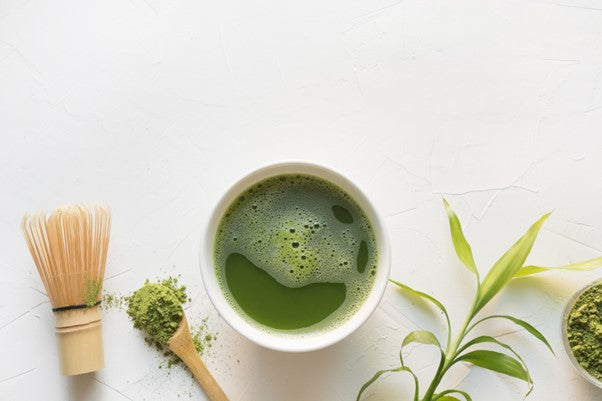
Matcha: Benefits, Facts, and Nutrition
Share
Matcha: Benefits, Facts, and Nutrition
What is Matcha?

Matcha is a type of green tea. It is ground into a fine powder.
This process creates a concentrated source of nutrients and antioxidants. Unlike regular green tea, which involves steeping leaves and discarding them, matcha uses the whole leaf. This makes matcha a strong source of health benefits. Let’s explore some matcha facts and why it’s such a popular health drink.
Matcha’s Health Benefits

Rich in Antioxidants
One of the biggest benefits of matcha tea is its high antioxidant content. It contains a lot of EGCG, or Epigallocatechin gallate. This compound helps protect your body from free radicals.
The antioxidants in matcha can lower the risk of chronic diseases. This includes heart disease and some types of cancer.
This makes matcha a great choice if you’re wondering, "Is matcha good for you?" The answer is a resounding yes.
Boosts Energy and Focus
Matcha boosts energy and improves focus. It does this thanks to caffeine and the amino acid L-theanine.
Unlike coffee, matcha does not cause a restless feeling. If you're wondering, "What does a matcha latte do for you?"—it gives you lasting energy and better focus all day. For example, a matcha latte is a delicious way to enjoy these benefits.
Helps with Weight Loss
For those looking to shed a few pounds, matcha tea can be a helpful addition to your diet. The weight loss matcha tea benefits come from its ability to boost metabolism, which increases fat burning. The matcha green tea weight loss effect makes it an excellent option for anyone trying to manage their weight.
Good for Your Heart
If you’re asking, "Is matcha good for your heart?" The answer is yes. Matcha helps lower LDL (bad) cholesterol while raising HDL (good) cholesterol, which may reduce the risk of heart disease. Drinking matcha green tea regularly is one way to improve your cardiovascular health.
Supports Your Immune System
The matcha health benefits also extend to your immune system. The antioxidants in matcha, including catechins, help your body fight off bacteria and viruses. Both ceremonial matcha and regular matcha provide protective benefits. This is why drinking matcha green tea can help support your body’s defense system.
How Much Matcha Should You Drink Per Day?

Wondering how much matcha is safe to consume daily? It’s recommended to have 1-2 cups per day. One cup contains about 70 mg of caffeine, which is lower than coffee but enough to give you an energy boost. How much matcha tea per day depends on your caffeine tolerance, but drinking matcha tea every day is safe and beneficial for most people.
Matcha Tea Benefits: Summary
To sum up, drinking matcha green tea provides the following benefits:
- It helps fight disease and slow aging by being rich in antioxidants.
- It boosts energy and focus without causing caffeine jitters.
- It aids in weight loss by improving metabolism.
- It promotes heart health by regulating cholesterol levels.
- It strengthens your immune system to fight off illness.
Pros and Cons of Matcha
Let’s look at the pros and cons of matcha:
Pros:
- High in antioxidants
- Helps with weight loss
- Improves focus and energy without jitters
- Supports heart and immune health
- Can be consumed as a matcha green tea latte, which retains many health benefits.
Cons:
- Caffeine sensitivity: Some people might experience side effects like insomnia or an increased heart rate.
- Potential lead content: Matcha may contain trace amounts of lead, so it’s important to buy from reputable sources.
Ceremonial Matcha vs. Regular Matcha
If you're debating between ceremonial matcha tea and regular matcha, the difference lies in quality and flavor. Ceremonial matcha is of higher quality, with a richer flavor and more concentrated antioxidants. While it’s more expensive, ceremonial matcha tea benefits tend to be stronger, making it a great choice for health-conscious individuals.
Is Drinking Matcha Everyday Bad?
No, drinking matcha every day is not bad for most people, as long as you don’t have a sensitivity to caffeine or consume excessive amounts. In fact, the matcha health benefits can be maximized with regular consumption.
Is Matcha Green Tea Latte Healthy?

Yes, a matcha green tea latte is a healthy option if made with minimal sugar. You can enjoy the same matcha tea benefits in a latte format, including enhanced focus, energy, and metabolism-boosting effects. Just keep an eye on added sweeteners.
Matcha Powder Nutrition Facts
Finally, let’s look at some matcha powder nutrition facts. Matcha has few calories but is high in important nutrients. It contains vitamins A, C, and E, along with potassium and iron. The antioxidants in matcha green tea extract offer additional health benefits, making it an excellent addition to your diet.
Looking for the best ceremonial matcha?
Purchase our ceremonial matcha powder “Luna Matcha - UMAMI BURST”!
Our high-quality, organic ceremonial matcha powder is good for health, offering a unique and flavorful experience. Don’t miss out!
